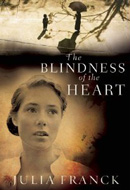


Grove Press, hardcover, 9780802119674 (October)
Vintage, paperback, 9780099524236 (under the title of The Blind Side of the Heart)
A prologue opens the novel. It is some time during World War II and a woman, Alice, abandons her seven-year old son at a railway station.
The story proper begins many years earlier in the town of Bautzen, where Helene and her family live. While Helene's father fights in World War I, she is left at home with her beloved sister Martha and her mentally-ill mother Selma. Helene is a happy child despite the tantrums and eccentricities of her mother. Selma spends weeks or months in her bedroom and is emotionally distant from her children:
One wonders whether Selma's condition is endogenous or the result of her being a Jewish woman in a Catholic town. Certainly she has unwillingly given up the rites of Judaism. Martha tells Helene that their mother's "heart has gone blind."
After the war Helene and Martha travel to the bright lights of Berlin and take up residence with their wealthy Aunt Fanny. They witness Fanny's decadent lifestyle—a string of lovers; money flowing copiously; and a carefree attitude to all that surrounds her. Martha is old enough to enjoy the night life of Berlin but Helene is too young and must remain at home with her dreams. She is a clever girl and yearns to study—medicine perhaps. (At this point I was still wondering how the life of the abandoned boy would intersect with that of Helene. I was hoping that she would adopt him.)
Time passes, Helene becomes a nurse and eventually falls in love, madly in love with Carl. Significant changes subsequently occur in Helene's life but that's all I'm telling of the plot. I really loved this novel and I don't want to spoil it for you.
Franck deals with World War II and anti-Semitism in an unexpected way. There are few overt references to any of it. Since one side of Helene's family is Jewish, people eventually disappear. Rather than focus on the horror, Franck stays with Helene's day-to-day life, and the war becomes an impingement on that. Believe me, the plight of the Jews is not diminished by this unusual presentation.
I was interested in the fact that the original title of this novel was Die Mittagsfrau, which translates as "The Foreign Woman." The townsfolk of Bautzen attach this moniker to Selma because she is Jewish and not of the town. The themes of foreignness and alienation are intrinsic to this novel. I don't believe that an author or a publisher is obligated to highlight the message of a book via the title. After finishing this novel, however, the original title did help me to collect my thoughts and understand the ending.
Franck's prose is very good but where she excels is as a storyteller. I enjoyed every moment inside this wonderful book.
Despite seeing the ultimate spoiler on the blurb of my edition, I was compelled to finish the last one hundred pages
in one sitting. I was transfixed. Oh, and The Blindness of the Heart (Die Mittagsfrau) won the German Book Prize
in 2007 so I'm apparently not alone.
